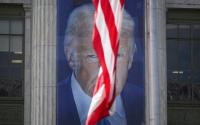Common Dreams / Published on Wednesday, October 26, 2005 by ReutersWill Dunham
A federal judge on Wednesday ordered the U.S. government to provide medical records on Guantanamo prisoners who are being force-fed while on a hunger strike and to notify their lawyers about forced feedings.
U.S. District Court Judge Gladys Kessler acted after lawyers representing about a dozen men held at the prison for foreign terrorism suspects at the U.S. naval base at Guantanamo Bay, Cuba, expressed urgent concern over their deteriorating health amid a hunger strike launched in early August.
Kessler stated in her opinion that the detainees' lawyers had presented "deeply troubling" allegations of forced feedings in which U.S. personnel violently shoved tubes as thick as a finger through the men's noses and into their stomachs without anesthesia or sedatives.
"If the allegations are true -- and they are all explicitly, specifically and vigorously denied by the government -- they describe conduct of which the United States can hardly be proud," the judge wrote.
Julia Tarver, a lawyer for the detainees, had told the court she learned during a visit to the base several weeks ago of force-feedings that caused prisoners to vomit blood. Tarver wrote, "When they vomited up blood, the soldiers mocked and cursed at them, and taunted them with statements like 'look what your religion has brought you.'"
Tarver told the court that prison guards took a feeding tube from one detainee, "and with no sanitization whatsoever, reinserted it into the nose of a different detainee."
The judge noted that the prison's commander stated the facility was operated "in a humane manner," and the head of the hospital there said that only doctors and nurses inserted feeding tubes.
LACK OF LEGAL RIGHTS
Their lawyers say the detainees are staging the hunger strike to protest their conditions and lack of legal rights. The lawyers accused the government of keeping them in the dark about their clients' medical condition.
The Pentagon said 26 of the roughly 505 prisoners currently were on hunger strike, with 23 of them hospitalized.
The New York-based Center for Constitutional Rights has estimated that about 210 were participating in the hunger strike. Detainee lawyers accused the government of deliberately under-stating the strike's scope.
The judge ordered the government to provide notice to the prisoners' lawyers within 24 hours of the beginning of force-feeding. Kessler also ordered the government to provide lawyers medical records for their clients spanning the week before a forced feeding, and provide these records at least weekly until force-feeding ends.
The judge denied the lawyers' request for immediate telephone access to their clients.
"The order is being reviewed," said Lt. Col. Mark Ballesteros, a Pentagon spokesman on detainee issues. He declined to comment on whether the government would appeal it.
Kessler's order affected a group of prisoners from Qatar, Saudi Arabia, Yemen and Afghanistan. Lawyers for detainees expressed hope the government would provide the same notification and data to lawyers for other hunger strikers.
The hunger strike is the latest flash point between the government and human rights groups over the camp, which activists call a blight on the U.S. human rights record.
Many Guantanamo prisoners have been there for more than 3-1/2 years, and just four have been charged with crimes. Rights activists have denounced these indefinite detentions and treatment they say amounts to torture. Most detainees were picked up in Afghanistan after a U.S. invasion in 2001 to oust the Taliban government and dislodge al Qaeda bases.






